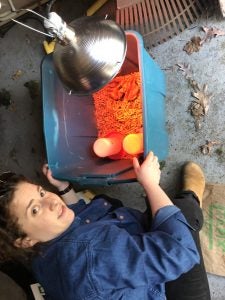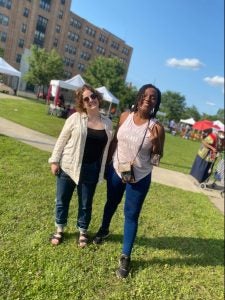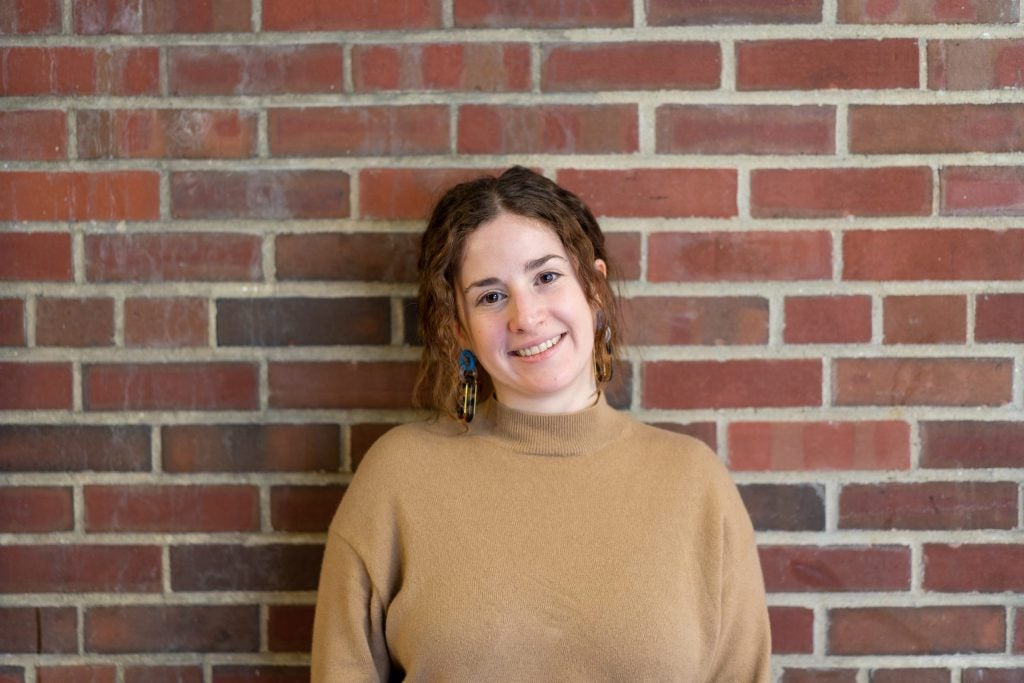August 2021
Interviewer: Asha McElroy
Clara Gamalski is a Sustainability Specialist in Student Life. She advises the UM Sustainable Food Program, Planet Blue Student Leaders, and other efforts to focus on developing experiential learning opportunities through the exploration of ideas about food systems, environmental health, community-building and social justice.
How did you become interested in working in sustainable food systems?
I’ve always really enjoyed cooking and eating which drew into my interest of building community and bringing people together. In 2011, I graduated from the University of Michigan with a Bachelor of Arts in Art History and Peace & Social Justice. As an undergraduate, I took a class with Dr. Stephen Ward that focused on the life of James and Grace Lee Boggs– two of Detroit’s most visionary activists and philosophers. That course transformed the way I engaged with the world and how I understood various influences on the Detroit food system.
As an undergraduate, I was trying to figure out my place in the world and struggled to figure out how to apply radical concepts to lived values. I believe these concepts are the reason why the world is shaped by systems of oppression. After college, I worked in restaurant food service as a server, cook, barista, dishwasher, and grocery store cashier. I enjoyed connecting with people from different backgrounds, and I began to notice that the more time I spent in food service, the better I felt about my place in the world and the impact that I had the potential to make.
The connections that I made helped me build something with others and get out of my head and become more mindful of colors, textures, and flavors. After a few years, I thought maybe there’s something to this food thing and I started looking into graduate school programs. I was interested in food access as a political concept and I applied to Chatham University. I was accepted into the Master’s program in food studies which focused on the sociology of food with practical training in sustainable agriculture, nutrition, public policy, and cultural history.
As a Master’s student, I worked at a restaurant called Conflict Kitchen which served food from countries that the U.S. was in conflict with. Additionally, I did some of their outreach and education along with one of the founders, Dawn Weleski, who was invested in developing my personal interests and pursuing my interests that aligned with Conflict Kitchen’s vision and mission.

After earning my Master’s degree, I moved back to Michigan and began managing a food justice program at the University of Detroit Mercy, and I learned that I love working with college students! I finally made my way back to U-M in 2019, when I joined the Student Life Sustainability team. In this role, I have the privilege of working alongside 50+ students in the UM Sustainable Food Program, Planet Blue Student Leaders, the Student Sustainability Coalition, and a team of incredible interns. Together, we use our campus as a sort of laboratory for experimenting with leadership for social justice and sustainable culture change. I love the way that these programs build off of the incredible academic offerings around food and the environment at U-M; the students who participate in these programs have a paid opportunity to apply this learning in a deeply personal, political, and creative way.
How can students get involved with food systems on campus?
- Please join UMSFP and the Campus Farm at the annual Harvest Festival on Sunday, September 26, 2021 from 1:00-4:00 pm at the Campus Farm.
- Students can learn more about the University of Michigan’s sustainable food system initiatives through the SFSI newsletter, Food Literacy for All and the University of Michigan Sustainable Food Program (UMSFP) which is nested within Student Life. UMSFP is a collection of student groups that organize and amplify the voices of interdisciplinary students working to make our university community food system more just, resilient, and sustainable.
- Students can join the UM Sustainable Food Program’s working groups which are creative, free-thinking collaboration spaces, where students of all disciplines can come together and think of visionary ways of improving the university, local or global food system while working with their peers to create action plans for their ideas.
- Students can stay up-to-date with everything UM Sustainable Food Program by subscribing to the weekly newsletter and attend UMSFP’s Rooting for Change: Student Food Summit in the spring.
- Buy produce grown by students for students at the Farm Stand outside of UM Museum of Art every Thursday from 12-3pm through the end of October. Revenue supports UMSFP’s mini-grants for food justice program that is available to all student organizations at the U-M Ann Arbor campus.
- Students can earn a Graduate Certificate in food systems or Food Minor for undergraduate students. You can click here to see SFSI’s list of food systems courses across campus.
- There’s over 100 different student organizations working on sustainability, classes and jobs so there are many ways to get involved. See the full list of ways to get involved at this link.
- Food insecurity is a significant problem across college and university campuses. Students experiencing food insecurity can access resources through thee Maize and Blue Cupboard. Students can also support this work by donating food, money, or volunteer hours to MBC.
- If you participate in any of the above opportunities, make sure to apply for an Excellence in Sustainability Graduation Honors cord to celebrate your contribution.
What makes you hopeful when you think about the future of our food system?
I have had the incredible opportunity to serve on the Detroit Food Policy Council (DFPC) as a representative for the colleges and universities sector. The DFPC has connected me with so many brilliant and creative individuals and organizations that want to see a food sovereign city and world.

Someone once told me that Detroit is the food justice capital of the world, and I believe it to be true. When I think about the future of food systems, I think about the lessons that I have learned from various individuals and organizations that have been doing work within Detroit to help residents with their vision of the Detroit food system to control their food system destiny. Within the food system, we need self-determination, so that community members have the right to make decisions about how food is produced, processed, consumed, and disposal. While including all political, social and economic systems that support communities in building their own power to center equity, it resists structures of white supremacy, patriarchy and capitalism. Another value of the future food system is regenerative agriculture to help build soil health and build community wealth using existing systems.



